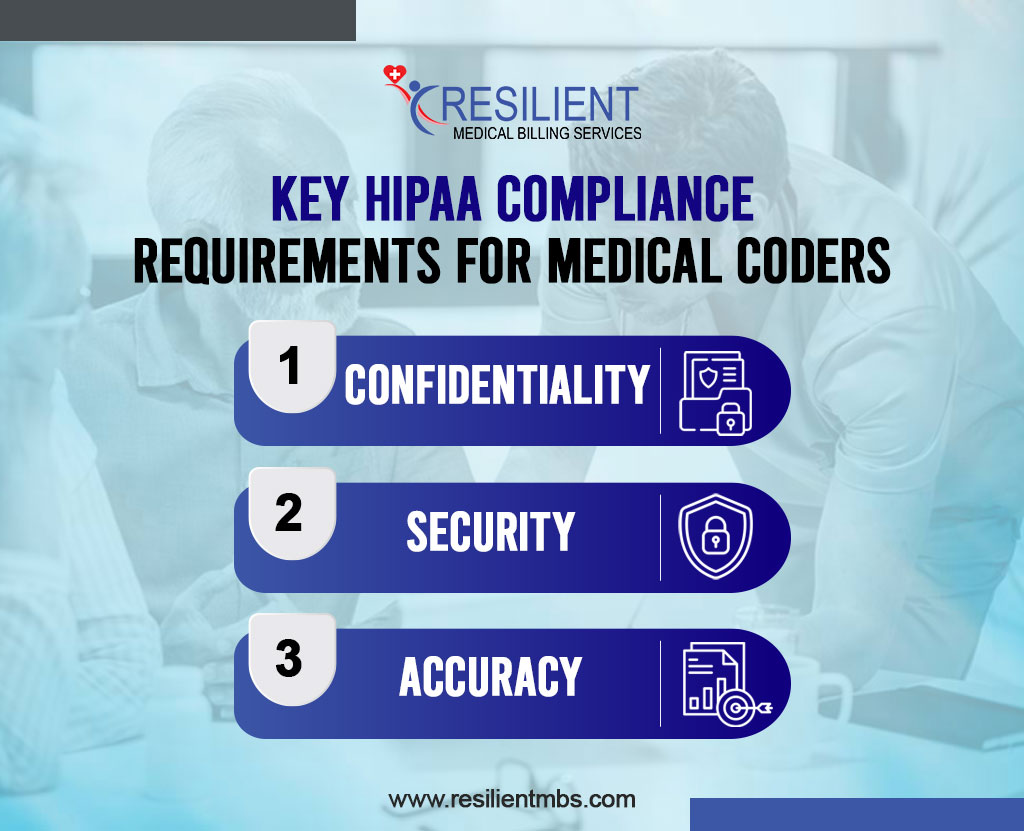HIPAA is a federal law designed to protect patients’ privacy and ensure the safe handling of medical information. It provides a secure framework for storing, accessing, and sharing health data when necessary.
For medical coders, HIPAA compliance is enforced in medical coding through strict guidelines, as they work daily with sensitive Protected Health Information (PHI). Even minor errors in coding or billing can result in data breaches or costly penalties.
In Virginia, healthcare providers emphasize HIPAA compliance in both billing and coding by following state and federal regulations. This not only safeguards patient information but also reinforces trust within the healthcare system.
In this guide, we’ll explore how HIPAA compliance is enforced in medical coding, the role of PHI, essential compliance checklists, and best practices to help coders stay compliant.
Understanding HIPAA Compliance in Medical Coding
HIPAA compliance in medical coding means adhering to federal standards when handling patient health information. Coders are responsible for keeping all PHI information private, accurate, and secure.
Protected Health Information (PHI) encompasses personal details, including patient names, insurance records, medical histories, diagnoses, and treatments. PHI in medical billing must only be used for approved purposes and safeguarded against unauthorized access.
In Virginia, HIPAA-compliant practices build patient trust and strengthen the integrity of healthcare organizations.
Benefits of Being HIPAA Compliant in Medical Coding
Builds Patient Trust
Patients are more likely to share accurate details when they know their medical information is secure, which improves overall care quality.
Protects Against Legal and Financial Risks
By following HIPAA compliance guidelines, providers avoid lawsuits, fines, and reputational damage while ensuring smooth billing operations.
Improves Data Security
Strong data encryption and secure systems minimize the risk of breaches and unauthorized access.
Enhances Operational Efficiency
Compliance promotes organized recordkeeping, clear documentation, and reliable billing processes.
Strengthens Professional Reputation
Healthcare organizations recognized for their strict HIPAA compliance are perceived as trustworthy, attracting more patients and partners.
Key HIPAA Compliance Requirements for Medical Coders
A HIPAA compliance checklist for coders often includes:

- Ongoing employee training
- Secure storage of data (digital and paper)
- Monitoring and logging access to PHI
- Prompt reporting of suspected breaches
Examples of HIPAA-Compliant Practices
- Assigning unique logins for each coder
- Encrypting patient data before transmission
- Limiting PHI access to staff directly handling care or billing
- Conducting regular internal audits
By using this HIPAA compliance guide and checklist, coders can ensure accurate billing while protecting patient privacy.
Enforcement of HIPAA Compliance in Virginia
In Virginia, HIPAA regulations are enforced by the U.S. Department of Health and Human Services (HHS) along with oversight from the Virginia Department of Health (VDH).
Healthcare providers adhere to strict privacy policies, implement secure technology, and undergo regular compliance audits to ensure that patient information remains confidential and secure. Violations may result in severe penalties, making staff training and regular reviews crucial.
Tools and Resources for Coders
- HIPAA compliance guides – Clear explanations with step-by-step checklists.
- Secure billing software – Encryption and restricted access to prevent data breaches.
- Ongoing training – Webinars, certifications, and compliance courses.
Challenges and Best Practices
Coders face challenges such as processing large amounts of PHI information, adapting to regulatory updates, and minimizing coding errors. To stay HIPAA compliant, they should:
- Use a HIPAA checklist consistently.
- Protect systems with multi-factor authentication.
- Attend refresher training sessions.
- Conduct routine audits to identify risks early.
These practices ensure compliance while reducing the chance of costly mistakes.
To improve compliance and prevent costly mistakes, many providers opt for HIPAA-compliant medical billing solutions from Resilient MBS LLC.
Updates and Changes in HIPAA Regulations
Recent Changes in Virginia
New updates emphasize stricter electronic PHI security, stronger breach notification protocols, and enhanced telehealth compliance. Coders must carefully manage digital patient records in line with these rules.
How Providers Can Stay Informed
- Provide staff with ongoing training opportunities.
- Follow HHS and VDH official updates.
- Use HIPAA compliance guides and checklists.
- Invest in secure medical coding tools.
Bottom Line
In Virginia, HIPAA compliance in medical coding is closely monitored through audits and penalties, making it essential for healthcare organizations to stay alert. Coders can help protect patient data and avoid mistakes by using secure tools, reliable technology, and ongoing training.
Following HIPAA rules is not just about meeting the law; it’s about respecting and protecting patient privacy. When coders and healthcare providers stay proactive, they foster patient trust and maintain the strength of their organizations.
This is a good time to review your HIPAA compliance checklist and ensure your coding processes adhere to the rules. If you’re unsure, a compliance expert can guide you and lower your risks.
For professional help with HIPAA-compliant coding and billing, contact Resilient MBS LLC. Their team offers clear guidance, practical solutions, and ongoing support to help you stay compliant and protect patient information.
FAQs
What does HIPAA compliance mean in medical coding?
It means coders must protect PHI by ensuring confidentiality, security, and accuracy when handling patient records.
Why is PHI critical in medical billing and coding?
PHI includes details like names, insurance information, diagnoses, and treatments. Protecting PHI in medical billing prevents breaches and maintains patient trust.
How is HIPAA compliance checked in Virginia healthcare practices?
Compliance is monitored through audits and reviews by HHS and VDH. Non-compliance can lead to fines, making regular staff training and secure systems vital.
What is included in a HIPAA compliance checklist for coders?
Secure recordkeeping, encryption of electronic PHI, restricted access, accurate coding, and continuous training.
Where can coders find a HIPAA compliance guide?
Guides are available from HHS, VDH, or internal healthcare compliance teams. They outline rules, checklists, and best practices for coders.










